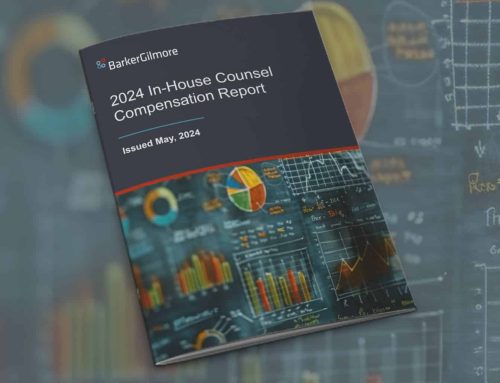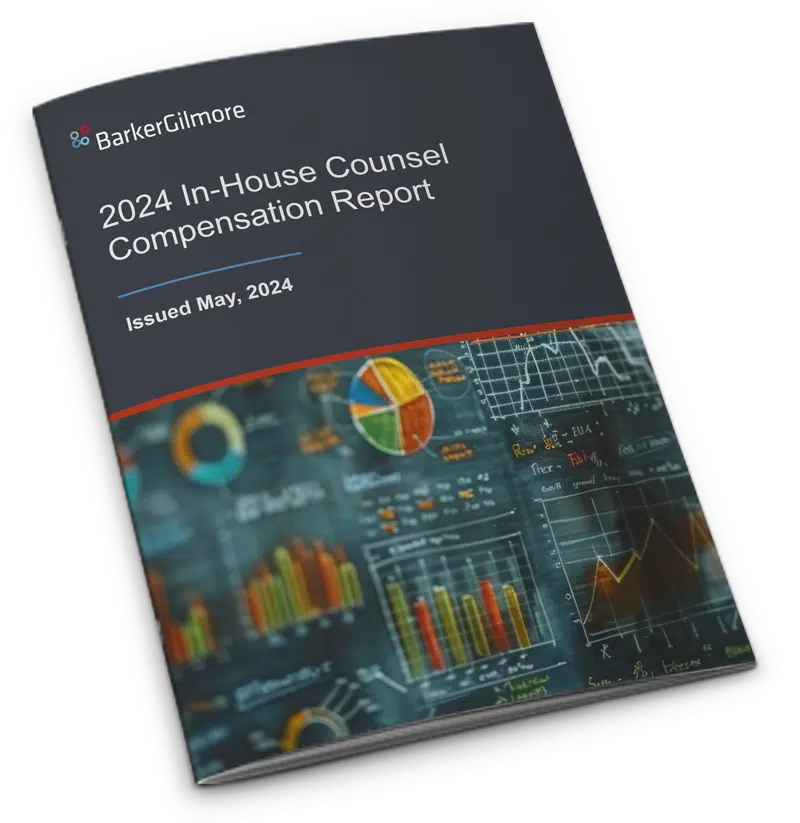Contributors: Jamey Seely | Jason Lynch
Private companies go through several stages before becoming public companies. So, too, General Counsel (GCs) must navigate the changing roles and functions of the position as a company progresses through these stages. In the GC AdvantageSM webinar, “The General Counsel’s Role in Private Company Growth at Each Development Stage,” we led a conversation regarding the GC’s role at various development stages. This article is a summary of our discussion.
The First In-House Attorney Hire
At the earliest stages, a company is focused on survival and the commercial viability of its product or service. The key objectives are designing and building the minimum viable product, building effective go-to-market processes, recruiting a core team that can execute the business plan, and securing enough capital to pay for all of it. As the saying goes, starting a company is “like riding a bike, except the bike is on fire, you’re on fire, and everything around you is on fire.” At that stage, little attention is paid to functions like legal, finance, and HR, that later will become essential parts of the company’s operating infrastructure. At this early stage, initial capital raising, commercial contracting, and intellectual property activities are handled by outside counsel.
Eventually, as a young company stabilizes, management will start to ask what legal functions should be brought in-house. Often the first impulse to do so comes from the belief that it will be cheaper to have in-house lawyers handle a function than continue to pay outside counsel for the work. For example, we frequently see this “build versus buy” analysis unfold for commercial contracting activities. Setting aside their billing rates, outside firms can rarely be as responsive to, or as integrated with, the business team in creating and closing commercial contracts as can a dedicated in-house attorney. Other legal functions that are especially important to a young company – such as IP (in hard technology industries) or regulatory considerations (in regulated industries) – will be susceptible to an impulse to replace outside counsel with in-house attorneys.
These functional hires are not General Counsel hires. At the earliest stages, the company is hiring for domain and functional experience, not seniority and strategic input. Eventually, a company will need a lawyer who thinks like a businessperson and is a strategic partner. The General Counsel hire comes later when the company is more mature and experiences legal needs beyond technical execution. The timing of this hire will vary but is often prompted when the legal complexity of operations requires project management, when the C-suite and board need daily legal input, when a company is pursuing an M&A-intensive business strategy, or when a company sees itself on a path to IPO.
Growing the Legal Department
Usually, a GC is hired when a company is growing, and there is an understanding by management that the legal function will become more important over time. Charting the growth of the department will be an essential function of the GC. The GC will need to consider how fast the company’s revenue is increasing and will need to grow the legal team appropriately to match that growth. As the legal team expands, ask:
- What and where is external legal spending?
- What risks is the company facing?
- Where is the business complex and in need of support?
- What are legal department benchmarks (in terms of percentage of total employees and/or size of legal budget) for comparable companies in my industry?
Using the answers to these questions, create a multi-stage plan for the CEO. We have seen success in the first phases of growing a department by hiring generalist attorneys who can handle a wide variety of work inside a growing company. In subsequent phases, add specialist lawyers to address specific risks. As the business changes, adjust the plan.
Defining the General Counsel as a Strategic Partner
As a new GC, defining the GC role starts with your approach to the position. Begin with the attitude that you are there to add value and not just fill a functional role. A new General Counsel can also define the role by:
- Getting involved in meetings. When starting at the company, ask to see the schedule of internal meetings. Attend several widely through the company initially. Determine which meetings are necessary to attend to participate in the decision-making and strategic discussions. This practice also provides an opportunity to provide positive advice on improving deals or contracts.
- Setting up periodic meetings with the CEO, CFO, and head of business development. Establish a regular cadence of meetings with the key executives. These are your business partners, and this group knows the dynamics and goals of the business. Learn where the company is heading and understand the business well enough to provide helpful feedback. A GC operating at a strategic level inside a company will be expected to have opinions on business matters, not just legal matters.
Perform Due Diligence Before Joining an Earlier-Stage Company
Before joining an earlier-stage company as an in-house attorney, perform due diligence on the company, including the following:
- Approach the opportunity like an investor. Ask about the company’s cash burn and runway, investor syndicate, and growth plan. The plans need to be realistic.
- Ask what the legal spending budget is. Use the question as a conversation starter to ensure access to advice and expertise from outside counsel when needed. It is a red flag if the company believes hiring its General Counsel will necessarily result in cost reduction. Zero spend on outside counsel is unrealistic because there will always be areas the in-house counsel does not have the expertise to cover without the advice of experts.
- Ask why the company is hiring in-house counsel at all. If you are the first in-house legal hire, or among the first, do not assume the management team has a comprehensive understanding of the legal need. And do not assume the team made the correct decision to hire against this set of needs. Test and explore their thinking. Management teams of young and growing companies often have no experience in working effectively with lawyers.
- As GC, determine to whom you will report. The GC reporting line will depend on the stage the company is in at the time and will reflect on whether the company intends the position to be strategic.
-
- In the early stages of companies, it is not uncommon for the GC to report to the CFO or COO. Often, this results from the fact that the first legal hires were functional hires where it would not make sense to have them report directly to the CEO. But have the discussion about the reporting relationship because it will say something about how the company views the GC role.
- Once a company matures and is in its growth stage, we believe it is important for the GC to report to the CEO. For a growing company, and certainly for a pre-IPO company, the legal function should be more than just a set of functions to be managed. It should be a strategic voice involved in the discussion of business strategy and in advising the board (see the next section for more about this). Evaluate your fitness for that kind of role when pursuing a private company GC position.
Manage Expectations Around Outside Legal Counsel
Early in a company’s life, outside counsel often have been in place for some time before the company hires a GC. While you must be thoughtful and diplomatic in assessing relationships with outside counsel, the GC should be the person responsible for hiring and firing counsel. Try to establish that understanding before taking a job.
Next, understand that in early- or growth-stage companies, the senior management team may have very little experience working with lawyers and may not know how to get the best work and service from outside counsel. One important role of the GC in companies at these stages is to interpret and explain the company’s legal needs to the management team, and to determine how best to meet those needs.
Once you have made your own inventory of the company’s legal needs, you can create a plan for what functions are best handled in-house and which should be handled by outside counsel. For the day-to-day needs of the company, evaluate the top ten compliance items to address, decide on a budget for each, and plan to roll them in through in-house hires as the business can support the cost.
For significant projects, like litigation, financings, fundraising, or mergers and acquisitions, you will need to educate the management team about the likely duration and cost of the legal work. Younger companies can be surprised by the expense of these projects. In addition to setting realistic expectations for the management team, your job will be to carefully manage the legal side of these events to ensure the cost is appropriate.
Litigation is a special case that can seem to defy predictions about duration and cost. Don’t accept the time work claim of outside litigators that “litigation is too unpredictable to budget; the best we can do is estimate.” Yes, litigation is unpredictable. But, when you have a trusting relationship with good counsel, you can build a phase-by-phase budget for litigation that counsel will agree to stick to, with the understanding that you and your counsel will have a conversation about changing the budget if fundamental assumptions about the case prove incorrect.
The Evolution of the GC’s Interactions with the Board
In the later stages of a company, the GC should have access to the board, and the board should rely on the GC’s expertise as primary legal counsel for the company. Access to the board will be more complicated, and the GC’s authority weakened, if the GC is several layers down in the organization.
Carefully nurture your relationship with each of the directors. This can be a delicate exercise, as you want to become more than a passive attendee at board meetings. Directors’ time and attention will mostly be focused on operational matters, and except in special situations, legal matters can seem ancillary to “the core business,” so be patient. Build trust through your professionalism, preparation, and absolute mastery of all matters you become involved in.
Understand that growth-stage private company directors may have little experience managing conflicts and fiduciary duties. Potential conflicts abound in private companies when a group of investors may participate in multiple equity financing rounds and general M&A opportunities for the company, all while sitting on the board. So, the GC must have the confidence and awareness to step in to help the board properly navigate those issues.
Best Practices in The First 90-Days as a New GC
In the first 90 days of being a new GC, the first tasks should include the following:
- Meeting with all existing outside counsel. Ask them to go deep into all work for the company. Get the scope and depth of this work.
- Reviewing all contracts. No one else is watching these, so ensure the contracts fit the purpose.
- Scheduling meetings with the CFO to ensure understanding of the company’s finances. Understand the details of how the company makes money. Learn about financial covenants you must be concerned with and who is watching out for these concerns.
- Begin developing good relationships with the leaders of each business unit. You’ll want to lay the groundwork for good business partnerships with these leaders. Recognize that some business leaders have unfortunate prejudices against in-house counsel, seeing them as creators of obstacles rather than constructive partners in growing the business.
- Getting a feel for audit dynamics. It is not necessary to be in the middle of the audit, but make sure to understand the dynamic and be fluent in what is happening. If you are the backup for the position in charge of audits, know what is coming.
Finding Guidance and Mentoring as a New GC
It is valuable to have other General Counsel as mentors. The GC role is nuanced because the individual must manage risk while being an accelerant to growth, a challenge best understood by other people in the same role. Try to find specialized groups online, such as General Counsel that work in tech or a women’s GC mentoring group.
If you’re leaving private practice, develop a curriculum to study for becoming a new GC. You will need to be conversant in a broad range of legal areas, far more than the typical private-practice lawyer has a working knowledge of. Outside counsel and high-quality continuing legal education can help with this curriculum. Colleagues can also provide feedback, enabling you to improve. Ask for feedback on what you do well and what you could improve upon.
BarkerGilmore also has resources you can tap into for a GC perspective, including coaching and advising from distinguished experts with private and public company experience.
The Level of Experience a GC Needs from Private to Public Company
In the twelve to twenty-four months before a company completes an IPO, a lot of time and resources are applied to “IPO readiness” projects, including assessment of whether the senior management team has the right people to lead a public company. The CFO and GC roles receive careful scrutiny because of their importance to effectively manage public companies. Public company SEC filings and regulation, exposure to shareholder litigation, exposure to activist shareholder campaigns, and the overall increase in public prominence that comes with being a public company are just some ways in which the GC job becomes more complex post-IPO.
Boards and CEOs often express a preference for GCs who have held the role at a public company, and it’s not uncommon to replace a GC who has served the company well while private in advance of an IPO. Is that necessary? In our view, no. In our experience, a skilled and effective private company GC can readily make the transition to public company GC. Hiring a new GC with public company experience just prior to an IPO may give the board some comfort, but it also comes at the cost of bringing in an important team member with no experience or history with the business. A private company’s incumbent GC with the right mentality – who understands how the role will change in a public company and has a plan to level up their expertise in new areas – can be the best choice to be the post-IPO GC. Indeed, much of the technical substance that comes with being a public company (e.g., SEC reporting) can be covered by outside counsel as the GC grows in experience.
If you haven’t been the GC of a public company before, embrace and address that concern. You must have a credible plan to become fluent in weaker areas. It is possible to bridge the gap in your experience by, for example, hiring an Assistant GC with SEC compliance expertise. You can also utilize BarkerGilmore’s Strategic Advisors and Coaches. BarkerGilmore’s team of experienced General Counsel and CCOs have experienced the same challenges many current and potential in-house legal leaders face each day and can counsel you on how to sell yourself and coach you on filling the role of a GC.
About the Authors:
Jamey is a Strategic Advisor and Coach at BarkerGilmore, and the General Counsel and Secretary of Crusoe Energy, one of the fastest-growing companies in the country, according to Inc. magazine. She is an experienced public company GC with particular expertise in leading companies through high growth stages of development, including IPO experience. Jamey has been in General Counsel roles for over 20 years and was formerly a partner with Holland & Knight prior to going in-house. Jason has been in practice for more than 20 years. Today, he is the General Counsel and Chief Operating Officer of Foundry, a venture capital firm with approximately $4.5 billion in assets under management and more than 60 technology companies in its portfolio. Prior to joining Foundry, Jason was in private practice in New York and Denver.
Jamey Seely and our team of professionals are happy to help accelerate the initiatives that you’re already pursuing or to supplement your current strategic thinking to help you realize your vision. Please reach out if you or your organization may benefit from our recruiting, leadership development and coaching, or legal and compliance department consulting services. Let BarkerGilmore help you build and optimize your legal and compliance departments.
Connect with a legal recruiting advisor
* indicates required fields






